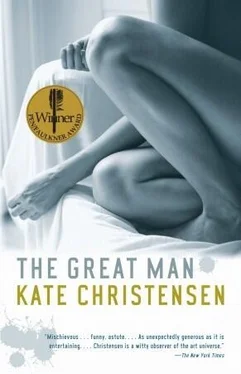“Stop romanticizing Oscar and me, Lila,” said Teddy. “I appreciate what you’re trying to say, but really, it was as complicated and messy as any relationship between two people always is.”
“Like I said,” Maxine said, “I have heard enough about Oscar for one lifetime. I don’t care if he and Teddy floated in fairy dust and little red cinnamon hearts together, I’ve had it with my fucking brother and all of you lovelorn girls who fell for his bullshit.”
“Good-bye,” said Teddy, pushing her chair back, standing up, smiling enigmatically. “Thanks very much for all the whiskey.” She walked toward the door with her head held high and disappeared through it.
Lila fluttered around, gathering her pocketbook, hooking it through her arm. At the door, she turned and said, “Abigail, I would love to have lunch with you someday, but of course I understand if that’s impossible. Good-bye, Maxine.”
After the door had closed behind Lila, Maxine made a harrumphing noise that might have been just her clearing the phlegm from her throat.
“That was very tense,” said Abigail.
“You were on their side,” Maxine said.
“I said exactly what I thought,” said Abigail. “I was being honest.”
“I find it very interesting,” said Maxine, “that this seemed to involve agreeing with them most of the time.”
“What about the things you said to me? Calling me a yellowbelly in front of Teddy! What sort of loyalty is that, Maxine?”
Maxine bunched up her mouth, looking away from Abigail and at Ethan. “What do you make of all these crazy old bats, Ethan?” she said loudly.
Ethan clucked his tongue against the roof of his mouth. Abigail said nothing.
“I bet you think we’re all out of our trees,” Maxine told Ethan.
“I’m not out of my tree,” said Abigail.
Maxine looked at her sister-in-law. “Well, sometimes I think I must be completely out of mine,” she said. It was as close to an apology as she had ever come.
“What did Moe Treitler say about Oscar that was so terrible?” Abigail asked, forgiving her grudgingly but completely, as always.
“Oh,” said Maxine. “I can’t tell you that.”
“Why not?”
“Because I can’t. I don’t know whether it’s true, for one thing. I only know what Moe told me.”
“Well, so tell me and I’ll take it with a grain of salt.”
Maxine called out, “Katerina!”
“Yes,” came a faint voice from the other end of the loft.
“Did you put those tefillin in the safe?”
“Yes,” came the stoic answer.
Maxine grimaced at Abigail. “I’m wrung out. That little meeting was goddamned debilitating.”
“Ethan,” said Abigail, wrung out herself, quailing at the thought of getting Ethan downstairs, hailing a taxi, getting him into it, then getting him out of it onto the sidewalk on Riverside Drive and into their building’s front door and elevator and finally their apartment, “it’s time to go home.”
Ethan said, “Unghhh.” His eyes were fixed on the ceiling now. His hands had come to rest on his thighs, still fluttering, like birds landing after a storm.
The next morning before breakfast, after a night of odd and upsetting dreams (one of which was about playing Scrabble with Ethan and having to pretend “eeokiys” was a word), Abigail got out the Manhattan White Pages, found a “Treitler, M” on Greene Street, and, without stopping to consider whether or not she might be opening a can of worms, dialed the number.
An hour later, her doorbell rang.
“Abigail Feldman,” said an ancient man in a slightly tattered black suit, a tattoo of a spider on his cheek. Shoulder-length greasy gray hair sprouted from his skull-like head. “You look just the same.”
She stared at him while he grinned at her. He was missing a front tooth.
“It’s Morris!” he said puckishly. “Moe Treitler.”
“Moe Treitler,” she said. Moe Treitler had always been on the stout side, stout and pink and somehow juicy.
“Esophageal cancer,” he said. “That’s why I look like this; I’m being eaten up from the inside. All those cigarettes finally bit me in the ass.”
“Moe!” Abigail said, recognizing him now by his breathy voice and hepcat manner, his glinting no-goodnik eyes. “Come in, come in.”
He followed her back to the kitchen, where Ethan sat at the breakfast nook. Morris chucked him under the chin and slid in next to him. “Ethan,” he said. “It’s been a fuckin’ lifetime, but you look just the same, too.”
Moe Treitler had been Oscar’s friend from childhood. They’d grown up together, had their bar mitzvahs the same year, chased girls together. Back before Oscar and Abigail were married, when they’d gone to jazz clubs in the Village, they had double-dated with Moe and a succession of his girls, most of whom Abigail had found intimidating, humorless, sophisticated, and slovenly. Then Oscar had married Abigail, and Moe had disappeared into Alphabet City to live in a tenement flat near Tompkins Square Park, where he’d cultivated through the years first a hipster heroin habit, then a full-blown addiction, and finally a rehabilitated, clean-living persona of righteous zeal. He painted street murals and enormous abstractions on stitched-together bedsheets and cheap fabric, played free jazz on his saxophone, mostly alone in the street for loose change but also gigs with other musicians when he could get them.
In the early years in the Riverside apartment, Moe had occasionally turned up for dinner with Oscar, both of them punchy and sweaty and hungry, often having walked the whole way uptown, shouting and arguing and gassing each other about what geniuses they both were. Moe always had some crazy outfit on, tie-dyed jeans and animal-fur vests in the sixties, top hats and glitzy ties and platform shoes in the seventies, velour jumpsuits and long silk scarves in the eighties, and then he’d disappeared from Oscar’s life after a blowup over something — Oscar wouldn’t say what.
Abigail hadn’t liked Moe Treitler much when he was sixteen and hadn’t cared much for him when he was twenty and thirty and forty, but she felt almost glad to see him now.
“You want a cup of coffee or something?”
“Coffee, great. Can I smoke in here?”
“I’d rather you didn’t,” said Abigail, pouring some coffee for him, “but all right.”
Moe settled in, stretched his legs out under the table, lit a cigarette, and fondled his coffee cup. He had always been excessively tactile, needing to claim whatever came into his orbit by touching it, whether it was a woman, an object, or food and drink. Abigail dredged up the ashtray Maxine always used when she visited, a souvenir from Maui that had come from she knew not where, and set it on the table in front of him.
“I can’t believe Ockie’s gone,” he said to Abigail, his eyes welling up. She remembered then his habit of tearing up easily, then pinching his nose as if staunching a potential cascade of tears. “Somehow sitting here makes it real in a way it wasn’t before. Makes me feel so fuckin’ old.”
“We are so fuckin’ old,” said Abigail. “I’m eighty; how old are you?”
“Yeah,” said Morris. “I’m the same as Ockie, so he would have been eighty-three now if he was still around. Time flies, life.”
“Time flies, life,” Abigail repeated. “It sure does.”
“Last time I saw Ockie, we almost killed each other. That was over twenty years ago, 1984. I remember that day like it was yesterday. Broke my heart, but I wanted to kill that guy. I wanted his neck between my two hands. We walked away like, pffft, it’s over, a lifelong friendship. And it really was. I kept thinking, you know, we’d…”
Читать дальше












